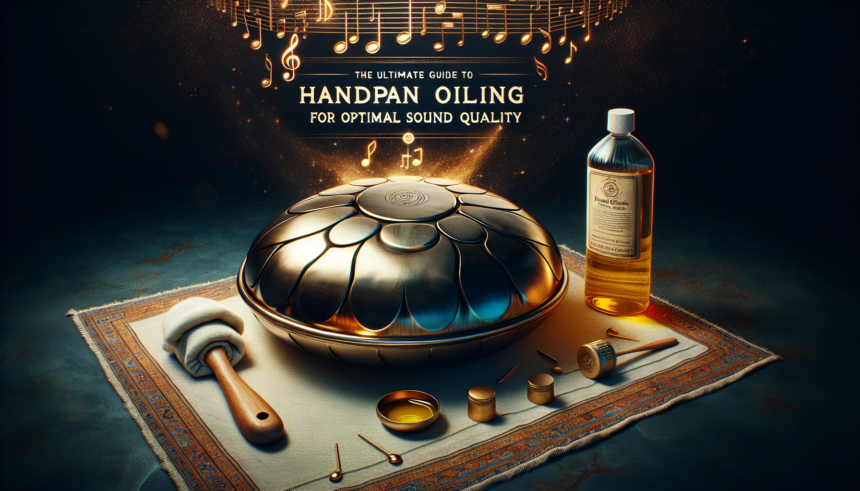Handpans, with their ethereal and enchanting tones, have captivated musicians and listeners alike. To maintain their pristine sound and ensure their longevity, regular maintenance is crucial. One of the most essential aspects of handpan care is oiling. This comprehensive guide will walk you through everything you need to know about handpan oiling for optimal sound quality.
Understanding the Importance of Handpan Oiling
Handpans are typically made from nitrided steel, stainless steel, or similar materials. Despite their rugged appearance, they are susceptible to rust and corrosion, which can adversely affect their sound quality and lifespan. Oiling serves multiple purposes:
- Rust Prevention: A thin layer of oil acts as a barrier against moisture, preventing rust from forming on the surface of the handpan.
- Enhanced Sound Quality: Consistent oiling helps preserve the instrument’s resonance and tonal clarity.
- Longevity: Regular oiling extends the life of your handpan by protecting the material from deterioration.
Choosing the Right Oil for Your Handpan
Not all oils are created equal. Some oils can be too viscous or sticky, while others might not provide adequate protection. Here are some oils commonly recommended by handpan players and makers:
- Pure Coconut Oil: A natural, non-toxic option that provides excellent protection and is easy to apply.
- Ballistol: A multipurpose oil that is popular in the handpan community for its anti-corrosive properties.
- Frog Lube: Known for its biodegradable, non-toxic formulation, which is safe for both the instrument and the environment.
- Phoenix Oil: Specifically formulated for handpans, it offers superior protection against rust and corrosion.
It’s important to use oils that are free from harmful chemicals and additives, as these can damage the handpan and pose health risks.
Step-by-Step Guide to Oiling Your Handpan
Proper technique is key when oiling your handpan. Follow these steps to ensure optimal results:
Step 1: Gather Your Supplies
Before you begin, gather the following supplies:
- The chosen oil for your handpan
- A soft, lint-free cloth or microfiber cloth
- Disposable gloves (optional, to keep your hands clean)
Step 2: Clean the Handpan
Ensure the handpan is clean and free from dirt and debris. You can use a soft cloth dampened with water to wipe down the surface. Avoid using harsh chemicals or abrasive materials that could scratch or damage the handpan. Allow it to dry completely before proceeding to the next step.
Step 3: Apply the Oil
Put a small amount of oil on the cloth. If using disposable gloves, wear them at this stage. Gently apply the oil to the handpan, covering both the top and bottom surfaces. Use circular motions to ensure an even layer. Avoid excessive oiling, as this can attract dust and dirt.
Step 4: Wipe Off Excess Oil
After applying the oil, use a clean section of the cloth to wipe off any excess. The goal is to leave a thin, even layer of oil that will protect the handpan without leaving it greasy.
Step 5: Let It Sit
Allow the handpan to sit for a few minutes to let the oil absorb. This helps in creating a durable protective layer. Afterward, you can use the cloth to buff the surface gently, giving it a nice shine.
Frequency of Oiling
The frequency of oiling your handpan depends on several factors, including the environment in which you store and play it, and how often it is used. Generally, it is recommended to oil your handpan every 1-3 months. Here are some guidelines:
- Humid Climate: If you live in a humid area, oil your handpan every month to prevent rust and corrosion.
- Dry Climate: In drier climates, oiling every 2-3 months is usually sufficient.
- Frequent Use: If you play your handpan frequently, consider oiling it more often to ensure optimal sound quality.
Storage Tips to Complement Oiling
In addition to regular oiling, proper storage is crucial for maintaining your handpan’s condition and sound quality. Consider these tips:
- Store in a Dry Place: Keep your handpan in a dry, cool place away from direct sunlight and moisture.
- Use a Protective Case: When not in use, store your handpan in a padded, protective case to prevent scratches and physical damage.
- Avoid Extreme Temperatures: Avoid exposing your handpan to extreme temperatures, as this can cause metal fatigue and affect sound quality.
Benefits of Regular Handpan Maintenance
Regular maintenance, including oiling, offers numerous benefits:
- Consistent Sound Quality: Routine oiling helps preserve the handpan’s tonal quality and resonance.
- Prolonged Lifespan: Proper care and maintenance extend the life of your handpan, allowing you to enjoy it for years to come.
- Enhanced Aesthetic Appeal: Oiling and cleaning give your handpan a polished, attractive appearance.
- Resale Value: Well-maintained handpans retain their value better, making it easier to sell or trade them if needed.
Conclusion
Caring for your handpan through regular oiling is essential for maintaining its sound quality, appearance, and longevity. By choosing the right oil, employing proper technique, and adhering to a consistent maintenance schedule, you can ensure that your handpan continues to produce enchanting music for years to come. Remember, a well-maintained handpan is not only a joy to play but also a valuable investment.
FAQs
- 1. Can I use any oil on my handpan?
- No, it’s important to use oils that are safe and specifically recommended for handpans. Avoid oils that contain harsh chemicals or additives that could damage the instrument.
- 2. How often should I oil my handpan?
- The frequency of oiling depends on your environment and how often you play. Generally, oiling every 1-3 months is recommended, with more frequent oiling in humid climates.
- 3. Can I use household oils like olive oil on my handpan?
- It’s best to avoid household oils like olive oil, as they can leave sticky residues and may not provide adequate protection. Stick to oils specifically recommended for handpans.
- 4. What should I do if my handpan already has rust?
- If you notice rust on your handpan, gently clean the affected area with a soft cloth and a small amount of oil. In severe cases, consult with a professional for proper rust removal.
- 5. Is it necessary to oil a stainless steel handpan?
- Yes, even though stainless steel is more resistant to rust, regular oiling helps maintain the instrument’s sound quality and appearance. It provides an extra layer of protection against corrosion.





